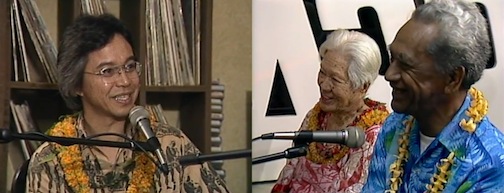Community Response
Ka Leo Hawai'i
In the 1970's, Larry Kimura attempted to teach himself Hawaiian. He later created a radio show called Ka Leo Hawai'i, or The Hawaiian Voice in English, where he interviewed anyone he could find that fluently spoke the language. Even within the first couple of broadcasts the show exploded in popularity. The Hawaiian Voice brought the endangerment of Hawaiian to the general public's attention because the majority of speakers at the time and everyone being interviewed was at least in their 60's. The younger generation wanted to know what was being said by their grandparents. Not only that, they were frustrated that they were deprived of their own native language.

An image of Larry Kimura interviewing native Hawaiian speakers for a broadcast (niuolahiki.ahapunanaleo.org)
Pūnana Leo
Translated to "Nest of Voices" in English, Pūnana Leo is an immersive, fully accredited education program taught entirely in Hawaiian. Language advocates noticed how endangered the Hawaiian language was, and new that its only hope of survival was in the hands of the youngest Hawaiian generation. In an effort to preserve the language, Pūnana Leo was created to not only expose the youngest generation to Hawaiian but anyone willing to do so as well.
"Today, a complete preschool through doctoral-level system of education in the state of Hawai‘i is taught entirely through Hawaiian." - ahapunanaleo.org
Legal Action
In the Hawaii Constitution...
Article X Section 4: "The State shall provide for a Hawaiian education program consisting of language, culture and history in the public schools."
Article XV Section 4: "English and Hawaiian shall be the official languages of Hawaii, except that Hawaiian shall be required for public acts and transactions only as provided by law.
Article XV Section 5: "The motto of the State shall be, 'Ua mau ke ea o ka aina i ka pono.'"
(lrb.hawaii.gov)
Media
It's easy to find all kinds of resources about Hawaiian just by looking it up online, including social media pages. There are pages dedicated to the language, music, food, and really anything about the culture you can think of. Here are a few examples of pages specific to the language...
